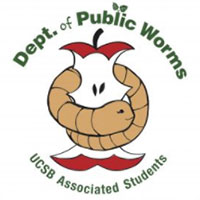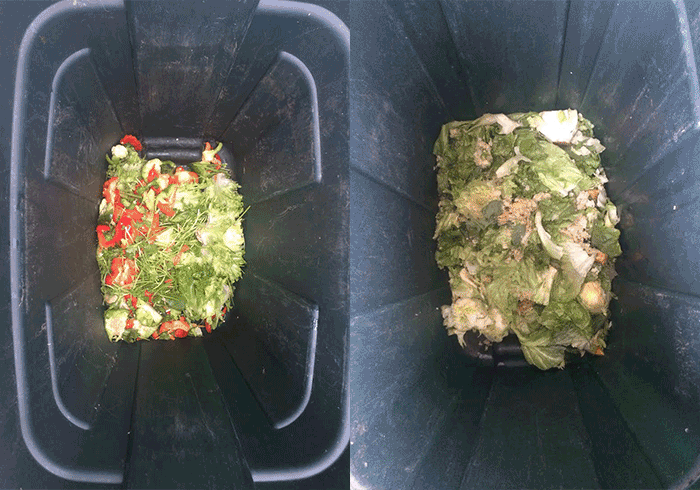A Pioneering Partnership

The Department of Public Worms & Residential Dining Services Join Forces to Create a Closed-loop Food System
You might have been on campus one day and seen a small green electric car pass by? Or seen a student at a Dining Commons loading dock digging into the kitchens’ compost bins? Or maybe you recently walked by the Gaucho Certified Farmers Market and heard a shout of “Come get your worm Valentines!” Associated Students Department of Public Worms (DPW) is behind all of this!
DPW is a student-run, student-funded department on campus that focuses on promoting environmentally sustainable practices. DPW does this by doing on-site composting at West and Storke Family Student Housing and holding informative and useful hands-on workshops for students such as “Indoor Composting with Worms!”, “Kitchen Cultivation: Gardening Indoors” and “Automated Hydroponics.”
In 2012 DPW partnered with Residential Dining with the goal of composting food waste on campus. DPW collects pre-consumer food waste (kitchen waste from vegetable trimmings) from Carrillo, Ortega, and De La Guerra Dining Commons. With only a total of six employees, a student worker goes by each dining commons every weekday morning and collects food waste. The foods that are collected includes vegetables and fruits - no meats, dairy, oils, or processed foods. At Ortega, about 10 to 20 pounds of coffee grounds are collected every morning as well. The food scraps are moved to the composting site at The Grove, near Facilities Management and Harder Stadium. All of this collecting really adds up. DPW diverts about one 20 ton truck of food scraps each year.
One way that DPW composts food scraps is through vermicompost, or composting using worms- hence the name, Department of Public Worms! They have two approximately 10’x3’x3’ wooden vermicomposting bins which house all the red wiggler worms that are involved in the composting process. About 100 pounds of food waste along with ample shredded newspaper as a carbon source is fed to each worm bin every week. The worms are fed all fruits and vegetables, except for oranges, onions, hot peppers and other acidic or burning foods that can damage them. The worms feed on the microbes that are breaking down the food. The worms’ solid excretions, or worm castings, are what we call worm compost. It’s collected and used in our educational fruit and vegetable garden on site or at our experimental farm. Worm tea, a form of liquid compost that is brewed from worm castings, is also used in our garden. The compost that is created from both hot compost and vermicompost is an excellent soil amenity because it increases soil water retention and adds nutrients to the soil for growing.
DPW is a relatively small organization on campus which makes it impossible to compost all of the food waste that is generated by the thousands of students served at the dining commons. Luckily, UCSB Residential Dining has ensured that the rest of this pre-consumer, as well as post-consumer (plate waste) food waste, is collected by Marborg and taken to be composted industrially in Santa Maria by a company called Engel and Gray.
The partnership between the DPW and the UCSB Dining Commons is resulting in huge amounts of goodness. By working together in collecting food waste from the dining commons and composting it on campus, the DPW workers and UCSB Residential Dining are helping to perpetuate a closed-loop food system. No wonder UCSB is one of the most environmentally aware colleges in the United States.

Scrolling photos submitted by Danielle Kemp.